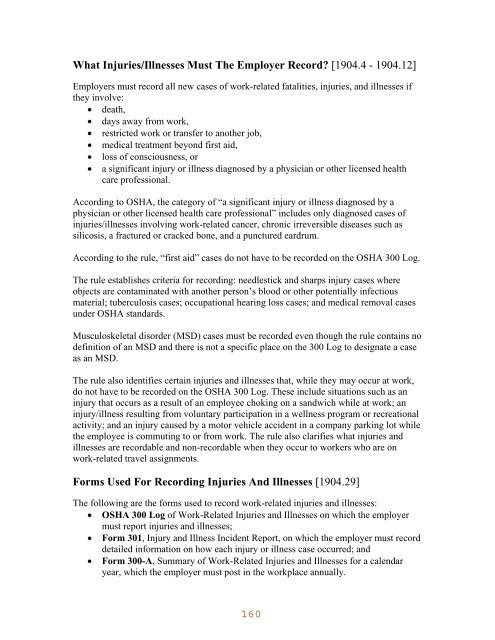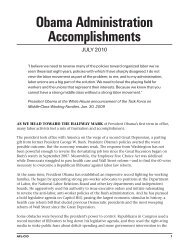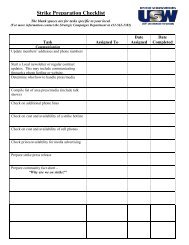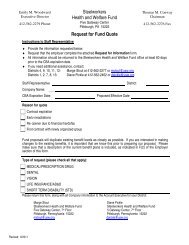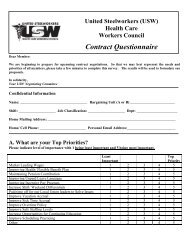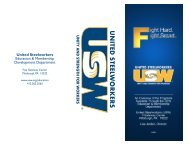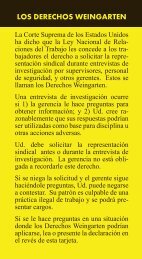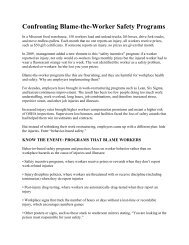Union Approach to Health and Safety: - United Steelworkers
Union Approach to Health and Safety: - United Steelworkers
Union Approach to Health and Safety: - United Steelworkers
Create successful ePaper yourself
Turn your PDF publications into a flip-book with our unique Google optimized e-Paper software.
What Injuries/Illnesses Must The Employer Record? [1904.4 - 1904.12]<br />
Employers must record all new cases of work-related fatalities, injuries, <strong>and</strong> illnesses if<br />
they involve:<br />
death,<br />
days away from work,<br />
restricted work or transfer <strong>to</strong> another job,<br />
medical treatment beyond first aid,<br />
loss of consciousness, or<br />
a significant injury or illness diagnosed by a physician or other licensed health<br />
care professional.<br />
According <strong>to</strong> OSHA, the category of “a significant injury or illness diagnosed by a<br />
physician or other licensed health care professional” includes only diagnosed cases of<br />
injuries/illnesses involving work-related cancer, chronic irreversible diseases such as<br />
silicosis, a fractured or cracked bone, <strong>and</strong> a punctured eardrum.<br />
According <strong>to</strong> the rule, “first aid” cases do not have <strong>to</strong> be recorded on the OSHA 300 Log.<br />
The rule establishes criteria for recording: needlestick <strong>and</strong> sharps injury cases where<br />
objects are contaminated with another person’s blood or other potentially infectious<br />
material; tuberculosis cases; occupational hearing loss cases; <strong>and</strong> medical removal cases<br />
under OSHA st<strong>and</strong>ards.<br />
Musculoskeletal disorder (MSD) cases must be recorded even though the rule contains no<br />
definition of an MSD <strong>and</strong> there is not a specific place on the 300 Log <strong>to</strong> designate a case<br />
as an MSD.<br />
The rule also identifies certain injuries <strong>and</strong> illnesses that, while they may occur at work,<br />
do not have <strong>to</strong> be recorded on the OSHA 300 Log. These include situations such as an<br />
injury that occurs as a result of an employee choking on a s<strong>and</strong>wich while at work; an<br />
injury/illness resulting from voluntary participation in a wellness program or recreational<br />
activity; <strong>and</strong> an injury caused by a mo<strong>to</strong>r vehicle accident in a company parking lot while<br />
the employee is commuting <strong>to</strong> or from work. The rule also clarifies what injuries <strong>and</strong><br />
illnesses are recordable <strong>and</strong> non-recordable when they occur <strong>to</strong> workers who are on<br />
work-related travel assignments.<br />
Forms Used For Recording Injuries And Illnesses [1904.29]<br />
The following are the forms used <strong>to</strong> record work-related injuries <strong>and</strong> illnesses:<br />
OSHA 300 Log of Work-Related Injuries <strong>and</strong> Illnesses on which the employer<br />
must report injuries <strong>and</strong> illnesses;<br />
Form 301, Injury <strong>and</strong> Illness Incident Report, on which the employer must record<br />
detailed information on how each injury or illness case occurred; <strong>and</strong><br />
Form 300-A, Summary of Work-Related Injuries <strong>and</strong> Illnesses for a calendar<br />
year, which the employer must post in the workplace annually.


